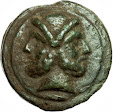Quintus Caecilius Metellus Pius Scipio
Nasica
Mint – Africa; 47 to 46 BC
Cr. 461/1
Roman Republican silver denarius, 47 - 46 BC
Military mint traveling with Scipio in Africa
Issued for Quintus Caecilius Metellus Pius Scipio Nasica, Imperator and
leader of army of Senate fighting Julius Caesar
Issued by Marcus Eppius, Legatus flandum curavit - or legate of camp
treasury which implies the mint was a military one. Sear in CRI notes this is
the only coin to use this title.
Obv - Head of Africa right wearing elephant's skin; grain ear before,
plow below; to right - Q METELL; to left - [SCIPIO IMP]; the elephant-skin
headgear represents Scipio’s African imperium.
Rev - Hercules standing facing; holding right hand on hip and with left
hand holding club that is draped with a lion’s skin, [resting on rock], to
right – [EPPIVS], to left - LEG F C
3.96 grams; 16.5 / 17.2 mm, slightly oval; off center 0.5 mm or 3% on obv
and 2.5 mm or 15% on rev
EF
Well struck from new obverse and older reverse dies.
Obverse art work is good. Reverse die is less so. Hercules looks a bit
like Jimmy Durante.
Flan is too small to hold art work. On obverse SCIOIO IMP and top part
of elephant are off flan. On reverse EPPIVS, Hercules feet and the rock are off
flan.
Crawford – 461/1
Grueber – Africa 10 – 14, 10 & 11 are large head
Sear, RCV – 1380/1 (large head) & 1380/2 (small head)
Sear, Imperators – 44
Sydenham – 1051
RBW - 1605
Quintus Caecilius Metellus Pius Scipio Nasica, was a consul with
Pompeius in 52 BC, the year he arranged the marriage of his newly widowed
daughter to him. He was a strong supporter of the rights of Patricians (the
traditional ruling class) against new men who were Plebians (free men who were
not Patricians). His father fought on the winning side of Sula against the
Marians. He fought unsuccessfully on the side of Pompey against Julius Caesar.
Patricians were historically afforded more privileges than plebeians.
They were better represented in the Roman assemblies. The Comitia Centuriata,
the main legislative body, was divided into 193 voting centuriae, or centuries.
The first two houses, consisting largely of patricians, together had 98
centuriae, a number which was enough to obtain a majority, despite the fact
that they were fewer in number. That meant that if the patricians acted in
concord, they could always determine the result of the voting of the people's
assembly. So, although it was not forbidden for plebeians to hold magistracies,
the patricians dominated the political scene for centuries.
He had consuls all over his family tree:
father - Publius Cornelius Scipio (Cons 80 BC) was the son of P
Cornelius Scipio Nasica Serapio (Cons 111BC).
mother - Licinia Crassa daughter of L Licinius Crassus (Cons 95 BC)
adopted son of Q Caecilius Metellus Pius - (Cons 80 BC), Metellus Pius
helped Pompey defeat Sertorius who led a rebellion in Spain
wife - Aemilia Lepida, daughter of Mamercus Aemilius Lepidus Livanus
(Cons 77 BC). He was engaged to Aemilia, broke the engagement and then decided
to marry her after Cato proposed. This made an enemy of Cato, the great orator.
daughter - first married son of consul, and when first husband died,
married Pompey (who had previously been married to Julius Caesar's daughter).
Distant relative (by adoption?) of Scipio Africanus – several generations
and too confusing for me to understand and relate here.
Ronald Syme called him "the last Scipio of any consequence in
Roman history."
Classical scholar John H. Collins said Metellus Scipio was as
personally despicable and as politically reactionary as they come. He was
honorable only in death. Having lost his armies in two battles in Africa, he
fled in a ship, but was driven back upon the African coast by a head-wind and
saw his ship in the power of the enemy. He committed suicide by piercing his
body with a sword; and when they asked where the commander was, he replied: '
Imperator se bene habet' (or "All is well with the commander.") In
death, Metellus Scipio achieved an uncharacteristic dignity, worthy of his
great forebears.
During the civil war between Julius Caesar and the senatorial faction
led by Pompeius Magnus ("Pompey the Great"), he remained a staunch
optimate (supporter of Patrician rights). He led troops against Caesar's forces,
mainly in the battles of Pharsalus and Thapsus, where he was defeated.


